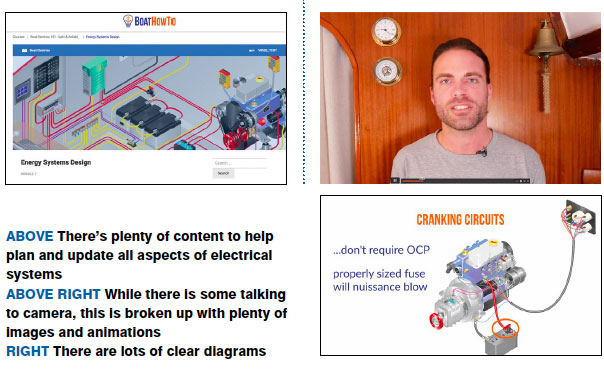Nigel Calder and his team of marine electrics experts have hit the mark, says Rupert Holmes in this Boat Electrics 101 review.
Arguably the most misunderstood aspect of boat maintenance concerns the electrical systems.
Price: US$199 – www.boathowto.com
Enter the code lifesaver at the checkout to get $10 off and boathowto.com will donate $20 to the RNLI.
To make matters worse, many older boats were not wired to a good standard and many have additional equipment added in a haphazard fashion. Indeed, even some new boats are still not shining examples of best practice.
This results in an unnecessarily high level of breakdowns, the potential for expensive battery banks to fail prematurely and, more worryingly, an increased risk of fire.
This comprehensive course from three of the world’s leading authorities on marine electrical systems – Nigel Calder, Jan Athenstädt and Michael Herrman – is therefore very welcome.

It covers all aspects of 12V and 24V DC systems, from the basics to complete rewiring projects.
Content is based on ISO and American Boat and Yacht Council standards that are widely used internationally.
Presentation includes a mix of learning styles, with videos as well as bite-sized chunks of text accompanied by both still and animated images or diagrams. Users are also sensibly reminded that learning is an iterative process and are advised to look back over older material to reinforce and deepen their understanding.
The authors make no apology for starting with the basic physics of how electrical circuits work, and it makes sense for owners who need to work on their own boat to have a clear understanding at a fundamental level.
I particularly like the section on how to make connections, which addresses many persistent myths and clearly shows what works best – and why – in different applications. Boat owners are also likely to find the sections on batteries, charging systems and holistic energy systems design equally useful.
No attempt to address 110V or 240V AC systems has been made. In my opinion that’s a sensible move as there’s already 56 lessons and eight hours of video information to absorb. In any case, this course is the first of three aimed at helping boat owners fill gaps in their background knowledge and expertise in a way that simply can’t be done through reading books.
VERDICT: The course is ideal for a wide range of people whether planning a refit, or intending to cruise longer distances where the ability to troubleshoot and repair without professional assistance may be essential. It’s equally suitable for anyone with no previous experience of working on 12V systems as well as for those with a background in engineering, for whom it will serve as a refresher on best practice.
The intention is to continue developing the course with additional material. Users are encouraged to suggest topics they’d like to see added or refined and anyone buying the course will have full access to these updates.
It is a valuable resource with useful planning tools and lots of essential advice.
8 Modules – 56 lessons – Price: US$199 – www.boathowto.com
Enter the code lifesaver at the checkout to get $10 off and boathowto.com will donate $20 to the RNLI.
Why not subscribe today?
This feature appeared in the September 2021 edition of Practical Boat Owner. For more articles like this, including DIY, money-saving advice, great boat projects, expert tips and ways to improve your boat’s performance, take out a magazine subscription to Britain’s best-selling boating magazine.
Subscribe, or make a gift for someone else, and you’ll always save at least 30% compared to newsstand prices.
See the latest PBO subscription deals on magazinesdirect.com




